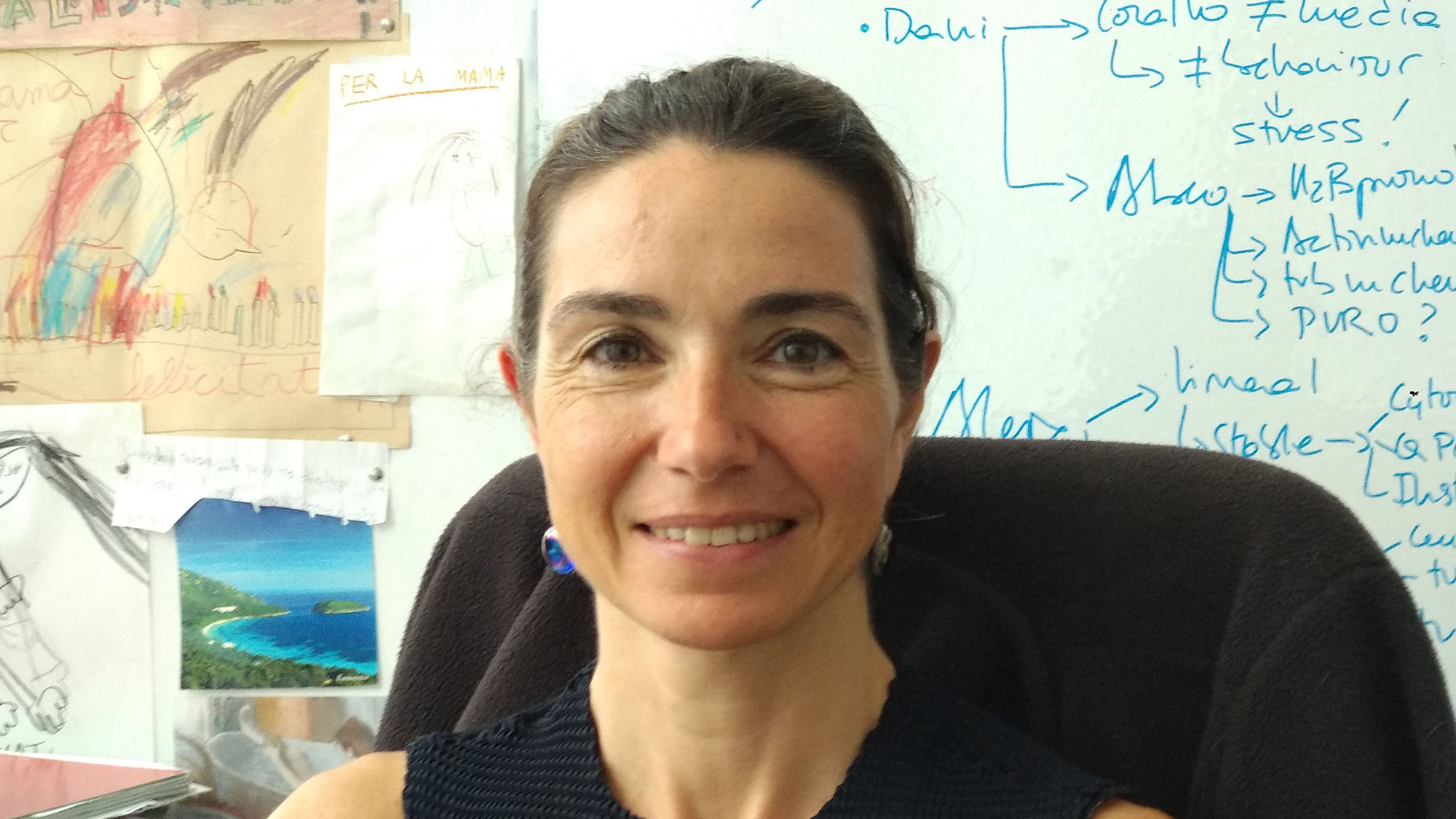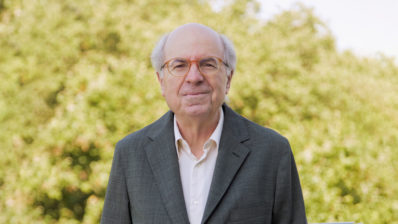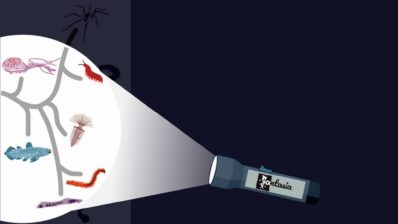Ten years ago, Elena Casacuberta (Barcelona, 1972) arrived at the Institute of Evolutionary Biology (IBE: CSIC-UPF), where she set up a research group to study mobile elements in Drosophila. Six years later, in the middle of the economic crisis, she had to join forces with another group from the center to work on the metamorphosis of insects. She currently shares a project with another group leader studying marine microorganisms. We talked to Casacuberta about her scientific career, and about topics as transversal and relevant in science as are adaptability, financing, evaluation or gender.
When you were a child, what did you want to become?
Scientist was not exactly a profession I had in mind … I wanted to be a gymnast; I was very athletic! When I was 16-17 years old, a biology teacher told us about the AIDS virus and I became fascinated by its biology. I also liked chemical formulations… And I have an older brother who is a scientist; he must have had some influence on me!
What did you study at the university?
I started chemistry and then biochemistry at the Autonomous University of Barcelona (UAB). But there were lots of things I liked… In fact, when I had to choose a degree, lots of different ones came to my mind, from mathematics to philosophy!
Then I did my PhD at the Development Research Center (CID) which is, in fact, where some of the founding groups of the IBE emerged from. My thesis was framed within the first sequencing project for a plant, Arabidopsis. I participated in the genome sequencing, assembly and analysis.
Through the Arabidopsis genome I discovered mobile elements and I was fascinated … I went to the MIT (USA) to do a postdoc with Mary-Lou Pardue, where I studied the evolution of a couple of very special mobile elements in Drosophila, which have an essential function, they act as telomerases. After 5 and a half years I joined the Institute of Molecular Biology of Barelona (IBMB) with a Junior ICREA grant and established my own group.
And immediately you came to the IBE, which had just been born…
Yes, I came to the IBE in 2008. My laboratory focused on the functional, regulatory and epigenetic study of telomeres in the Drosophila model and mobile elements in order to understand this unusual relationship between mobile elements and their host genome.
Then, the crisis came…
Yes, it was a time where many things came together; setting up a laboratory, a personal project with two young children and the beginnings of the IBE which were demanding and difficult. With the crisis, I lost my project so, with two IBE colleagues, Xavier Franch and David Martín, we decided to create a research group. Our group lasted 3 years and we shared the project of studying the evolution of metamorphosis in insects, focusing on the genes that regulate the passage to adults. We used different insect models in addition to Drosophila, such as the flour beetle, Tribolium castaneum. During this time we directed the thesis of Sílvia Chafino, an exceptional student. It was a beautiful project.
And then?
I started collaborating with Iñaki Ruiz-Trillo, another Principal Investigator at the IBE, who studies the origin of multicellularity in animals. The MultiCellGenomeLab works with unicellular eukaryotic organisms, for which at that time there were no tools to manipulate them genetically. We joined forces since, during my career, I have worked with different non-model organisms and, therefore, had experience in the development of these tools. Iñaki asked me to join him in a collaborative project to develop genetic tools in some of these organisms, and we have been working together for more than four years.
How difficult has been to change topics so much during your career?
I am very ‘molecular’; in spite of working in evolution, I am not a field biologist, but a lab one. Different topics call my attention, and my expertise can be applied to different systems and questions, so it was not that difficult for me to change projects. If something characterizes my career is that I have worked with both model and non-model organisms, for which there are no genetic tools; you have to work very differently…
Changing topics is not easy because it is necessary to immerse yourself in a whole new world of knowledge as well as in a new scientific community but, at the same time, it is stimulating. I miss the study of mobile elements, despite continuing to review articles on this topic. I don’t rule out coming back one day.
“I am very molecular, and my expertise can be applied to different systems and questions; that’s why it was not that difficult for me to change projects”
Elena Casacuberta
How do you see the issue of financing in Spain?
The trend throughout Europe is to finance things that have transferability… Basic research is getting the worst of it. The axes of the European framework project H2020 were already quite applied, and those that come will be more. And in Spain, and Catalonia – even in the Barcelona City Council – they focus on the same axes. Everyone funds the same, and that makes no sense to me. Even when evaluating research centers, when looking at productivity there is a mandatory transfer part. And there are centers – such as IBE – that carry out very basic research, without obvious transferability… Science needs to study many things, and if you don’t promote basic science, there comes a time when you are left empty.
“Everyone funds the same things… But science needs to study many things, and if you don’t promote basic science, there comes a time when you are left empty”
Let’s talk about gender…
We created the IBE gender committee 4 years ago, with Iñaki. At that time in the IBE we were 4 women and 20 men as Principal Investigators – we thought it was very necessary to straighten this relationship and other aspects in which there was no equity. Since then two new group leaders have come; a man and a woman. Little by little… I think we have improved a lot at the level of awareness. An initiative that worked very well was the “Women in evolution” day – a scientific morning with researchers leading research projects in the field of evolution. We looked for researchers who were at different times of their careers and who worked in different countries and could be good references for the IBE. We dedicated the morning to science, followed by a debate on gender in different fields of science in the afternoon. We had a very high attendance of IBE members, as well as some other institutes of the Barcelona Biomedical Research Park (PRBB).
Have you managed to change things?
I think we have influenced when it comes to inviting more women to give talks – now they make up 50% of the speakers at IBE events. We have also achieved parity in our external evaluation commission, which initially was six people, all men, and now there are three men and three women. Our goal for 2019 is to conduct a training on gender equity aimed at all the Principal Investigators.
And you, have you ever personally suffered gender discrimination?
The truth is that my awakening on this issue has been gradual… There are many things that have happened to me that, at the time, I did not perceive them from the point of view of gender but, in retrospect, they clearly were. Now I always wear the “gender equity glasses” , and I see issues continuously, everyday attitudes that I still suffer. Some of them I no longer let them pass, others depend on the day, because in the end you must choose your battles… It really is a complicated issue, because there are social inertia that we have always had, both men and women. If you do not want to be aware and proactive on the subject, it is very easy to fall.
“(On the issue of gender) There are social inertia that we have always had, both men and women. If you do not want to be aware and pro-active on the subject, it is very easy to fall”
In fact, I suffered a case of ‘almost harassment’ in a congress. Someone in a situation of power tried to take advantage. It affected me a lot, I even felt ashamed. I had a paper I was working on with him and I kept it in a drawer for months, I couldn’t face it. In this regard, the PRBB women’s peer mentoring group helped me a lot – they encouraged me, saying that I had every right to publish the article and move on. I have to say it’s the only time something like this has happened to me – and I’ve been to many conferences and met wonderful people! – but it’s very, very serious that it happens at all.
Tell us about this peer mentoring group …
It was an initiative of the PRBB Intervals programme as an experimental group: peer mentoring exclusively for women. For six years, female researchers from the different centers of the park have been meeting every six weeks. Some people left, others arrived who have wanted to join. For me it has been basic to overcome difficult moments, to believe in myself as a scientist, even to straighten some attitudes of my own – it helps a lot when a third person who can see things about yourself that you do not see, looks at you and tells you about them, in a neutral way and always thinking about how to improve your performance as a scientist.
How are scientists evaluated?
We are evaluated above all, by our publications and the ability to attract projects, two things that are always closely linked. For me the evaluation of science should not fall so much individually, but at the group level. In science you can’t do things by yourself. Nowadays, outreach and teaching are more taken into account; if you have masters or final degree students in the laboratory… I participate every year in the “Joves i Ciència” programme. It is demanding, but also very rewarding. Seeing the excitement of these young people the first time they enter a real laboratory… It somehow returns you to the time when you felt the same and helps you to renew this illusion. And it is important to renew it from time to time, because this emotion of understanding what is behind a phenomenon is the essence of being a scientist; and sometimes when things don’t go as you would have hoped, it’s easy to lose this feeling…
“The emotion of understanding what is behind a phenomenon is the essence of being a scientist”
What is the best of research?
That feeling of uncertainty, of never knowing where your research will take you… Each opened door open opens three or four more! And technology advances very fast, so I like to continue in the bench, catching up with the latest techniques… We could say my work is very varied; what I do now has nothing to do with what I did five years ago! It’s also great to be in touch with people from all over the world, the collaboration…
And the hardest part?
Doing all of this with few resources. Competition. And both things together… It’s hard to bear, and it takes a lot of resilience.
Do you think there is too much competition in research?
Yes! I think the essence of science is being lost. Before, what was sought was to advance in the field; things were shared, there was more confidence, more generosity… Now we are more worried about who publishes first.
I also think it is a big mistake to evaluate people as if the articles were only theirs. Science is not done individually, teams are essential. But if your name doesn’t appear neither the first nor the last in an article, but in the middle, it is almost not taken into account… I think this should change right now.
“I think it’s a big mistake to evaluate people as if the articles were only theirs. Science is done as a team.”
What would you advise young people who are considering a career in research?
That they give it a go and that they do it in more than one place; do not take a rushed decision. Try to enjoy the path. Don’t focus only in the final result, because it can be very frustrating. Being a scientist consists of many things: thinking, analysing, experimenting, creating, documenting… We are not all good at everything; we must be aware of our own weaknesses and seek allies. As I said, teams are basic in science.







